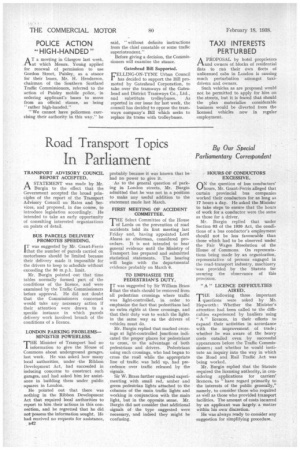Road Transport Topics
Page 52

If you've noticed an error in this article please click here to report it so we can fix it.
In Parliament
By Our Special Parliamentary Correspondent
TRANSPORT ADVISORY COUNCIL REPORT ACCEPTED.
ASTATEMENT was made by Mr. Burgin to the effect that the Government accepted the broad principles of the report of the Transport Advisory Council on Rates and Services, and proposed, in due course, to introduce legislation accordingly. He intended to take an early opportunity of consulting interested organizations on points of detail,
BUS PARCELS DELIVERY PROMOTES SPEEDING.
[T was suggested by Mr. Grant-Ferris 'that the number of parcels carried on motorbuses should be limited because their delivery made it impossible for the drivers to keep to schedule without exceeding the 30 m.p.h. limit.
Mr. Burgin pointed out that time tables normally formed part of the conditions of the licence, and were examined by the Traffic Commissioners before approval. He did not doubt that the Commissioners concerned would take any necessary action if their attention were drawn to a specific instance in which parcels delivery work involved breach of the conditions of a licence.
LONDON PARKING PROBLEMS— MINISTER POWERLESS.
THE Minister of Transport had no information to give the House of Commons about underground garages, last week. He was asked how many local authorities, under -the Ribbon Development Act, had succeeded in inducing concerns to construct such garages, and had asked him for assistance in building them under public squares in London.
He pointed out that there was nothing in the Ribbon Development Act that required local authorities to report to him their actions in this connections and he regretted that he did not possess. the information sought. He had received no requests for assistance,
B42 probably because it was known that he had no power to give it.
As to the general question of parking in London streets, Mr. Burgin admitted that he was not in a position to make any useful addition to the statement made last March.
FIRST MEETING OF ACCIDENT COMITTEE.
THE Select Committee of the House of Lords on the prevention of road accidents held its first meeting last Friday and, having appointed Lord Alness as chairman, considered procedure. It is not intended to hear general evidence until the Ministry of Transport has prepared and submitted statistical statements. The hearing will begin with the departmental evidence probably on March 6.
TO EMPHASIZE THE PEDESTRIAN'S DUTY.
IT was suggested by Sir William Brass "that the studs should be removed from all pedestrian crossings where traffic was light-controlled, in order to emphasize the fact that pedestfians had no extra rights at these crossings, and that their duty was to watch the lights in the same way as the drivers of vehicles must do.
Mr. Burgin replied that marked crossings at light-controlled junctions indicated the proper places for pedestrians to cross, to the advantage of both pedestrians and drivers. Pedestrians using such crossings, who had begun to cross the road while the appropriate line of traffic was held up, had precedence over traffic released by the signals.
Sir W. Brass further suggested experimenting with small red, amber and green pedestrian lights attached to the columns of the main traffic lights and working in conjunction with the main light, but in the opposite sense. Mr. Burgin did not consider that additional signals of the type suggested were necessary, and indeed they might be confusing. HOURS OF CONDUCTORS EXCESSIVE.
(IN the question of bus conductors' Ia./hours, Mr. Grant-Ferris alleged that certain provincial bus companies worked their conductors for as long as 17 hours a day. He asked the Minister to take steps to ensure that the hours of work for a conductor were the same as those for a driver.
Mr. Burgin replied that under Section 93 of the 1930 Act, the conditions of a bus conductor's employment should not be less favourable than those which had to be observed under the Fair Wages Resolution of the House of Commons. On representations being made by an organization, representative of persons engaged in the road-transport industry, machinery was provided by the Statute for securing the observance of this provision.
" A " LICENCE DIFFICULTIES AIRED.
THE following three important questions were asked by Mr. Hepworth : Whether the Minister's attention had been called to the difficulties experienced by hauliers using " A " licences, in their efforts to expand their activities in accordance with the improvement of trade; whether he was aware of the heavy costs entailed even by successful appearances before the Traffic. Commissioners; and whether he would institute an inquiry into the way in which the Road and Rail Traffic Act was being worked.
Mr. Burgin replied that the Statute required the licensing authority, in considering applications for carriers' licences, to "have regard primarily to the interests of the public generally," namely, to consider those who required as wen as those who provided transport facilities_ The amount of costs incurred by an applicant was largely a matter within his own discretion.
He was always ready to consider any suggestion for simplifying procedure.




















































































